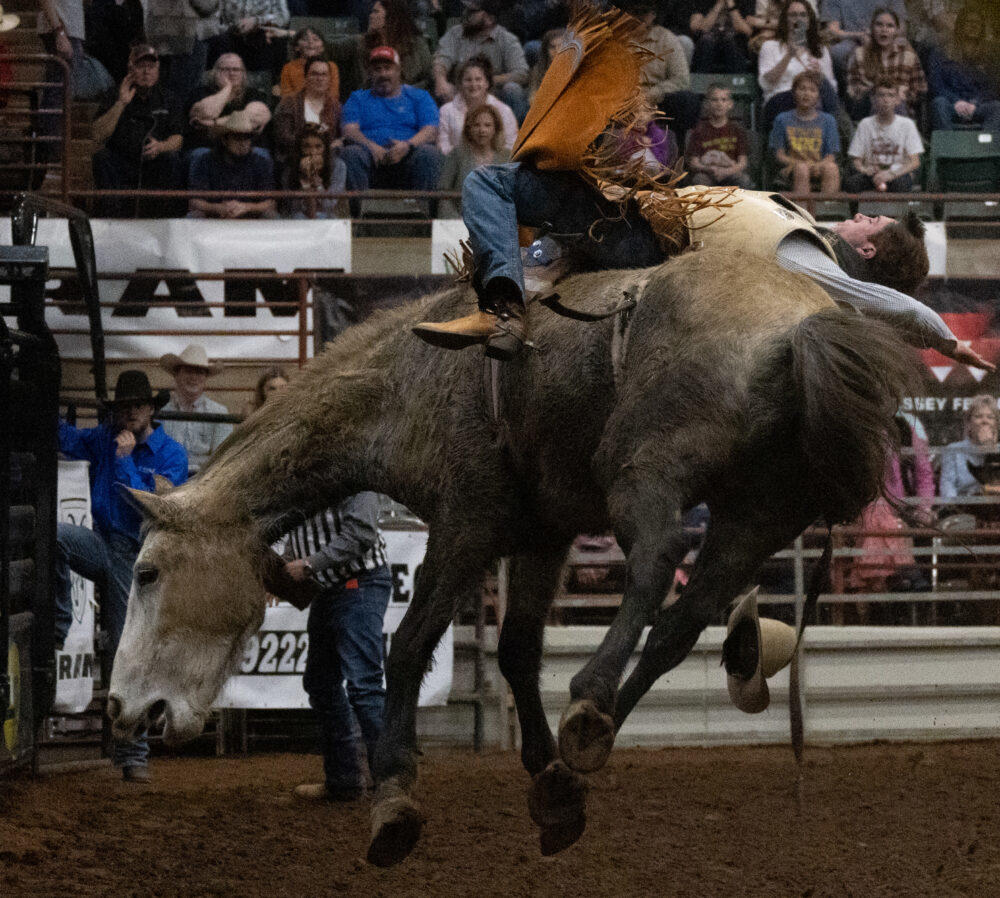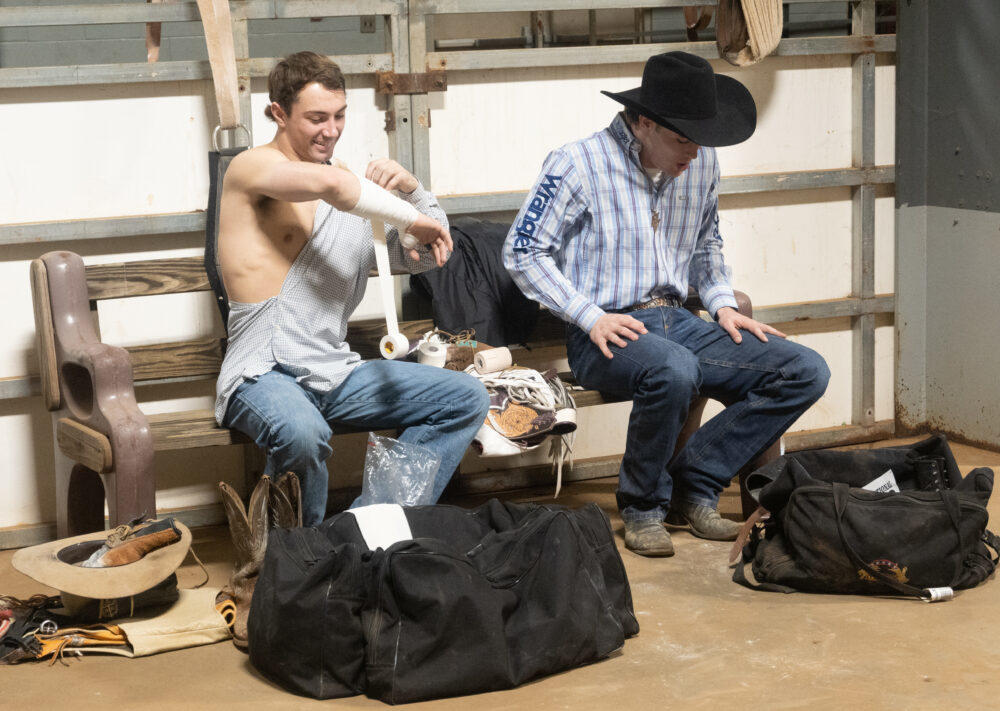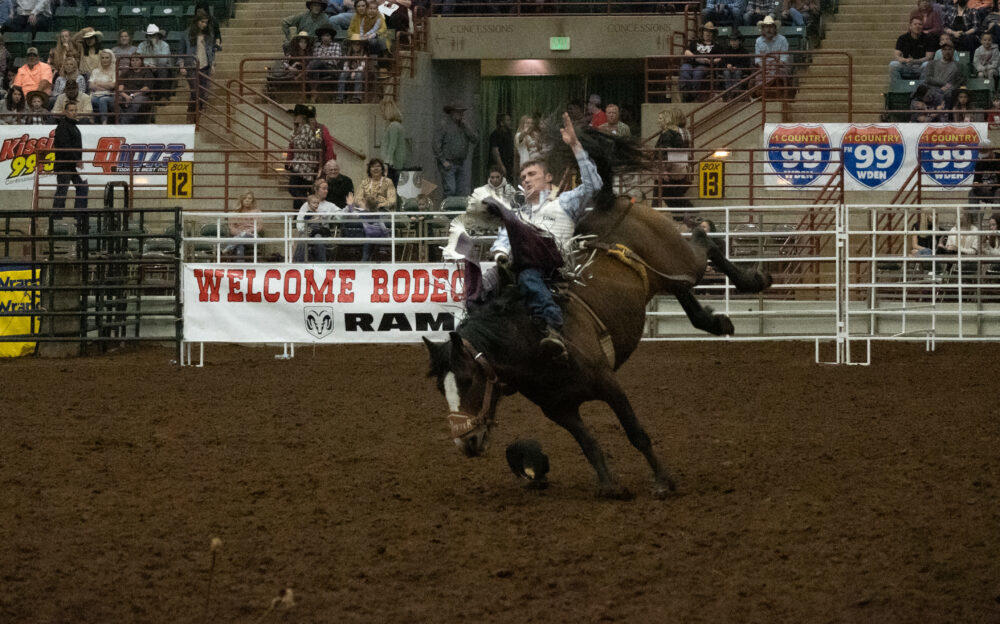
Caption
Bareback rider Isaac Ingram on the unnamed horse he was assigned for the rodeo.
Credit: Alex Guevara/Fresh Take Georgia
|Updated: March 20, 2022 7:43 AM

Bareback rider Isaac Ingram on the unnamed horse he was assigned for the rodeo.
After a moment of stillness, the gates swing open and bareback rider Isaac Ingram rockets into the freshly tilled arena on the back of a bucking gray bronco.
The air is heavy with tension as the crowd watches, waiting to see how long Ingram can stay on his horse as it whips him around, sending his hat tumbling to the ground as he spurs up to stay in the competition.
Every February, thousands of people travel to the Georgia National Fairgrounds and Agricenter in Perry to watch cowgirls and cowboys like Ingram compete in the Georgia National Rodeo, the only rodeo in the state that affects world rankings.
The tradition continued throughout the coronavirus pandemic and this year drew more than 200 competitors from across North America who performed in events like bareback riding, saddle bronc riding, bull riding, tie down roping, team roping, steer wrestling and barrel racing.
“This is the best job in the world to us, because it’s eight seconds of fun, and we get to travel the country doing it with our buddies,” said Ingram, who hails from Eunice, Louisiana, and ended up placing fourth in bareback riding, earning $405.
Among Ingram’s newest rodeo buddies was Weston Hamilton, from Tellico Plains, Tennessee. The two spent several hours looking over the horses they had been assigned as livestock handlers moved bulls, calves and steers all around them.
While contestants in events like tie down roping and steer wrestling bring their own horses, contractors like the Barnes PRCA Rodeo Company provide the bareback and saddle bronc riding horses, which are randomly assigned. These horses are called “broncs,” short for broncos, a term for partially-tamed horses carried over from rodeo history.
Cowboys and cowgirls can research their assigned horses online as well as contact others who have previously ridden them to learn about their temperaments and history, Hamilton said.
“You know your horse a few days in advance, so you can find out if it’s a horse that you don’t want to get on,” said Hamilton. “They do that so that everybody has a fair opportunity to win money. The contractor wants their horses to do well, so they bring a pretty even pen.”
Bareback riding can be fun, but it takes a great deal of courage, said bareback rider Hunter Ramsey of El Dorado, Arkansas.
“The second you think you’re going to get hurt is the second you get hurt,” Ramsey said. “But if something happens, I’d rather something happen out there than spend my life wishing I was doing something.”

Bareback riders Isaac Ingram (left) and Hunter Ramsey (right) preparing for their part of the competition in the backstage area.
Bullfighter and animal handler Luke Moore of Audubon, Iowa, is well acquainted with the dangers of the rodeo. Part of his job is to distract the bull after a rider has fallen so that he or she has time to get off the ground before being trampled by the animal.
“Those guys see a lot of leg injuries, and sometimes guys will hang up or get slammed down,” Moore said of the rodeo competitors. “Typically, you don’t see many terrible injuries, but every once in a while a guy will break a leg or a hip and they’ll be hung up for a while.”
Despite the grueling nature of the sport and the significant time investment in training, travel and competition, the culture and camaraderie surrounding rodeos brings in new contestants and keeps veterans returning. For many cowboys, the rodeo is a family affair, said Ramsey.
“I grew up in it,” Ramsey said. “My dad rode bareback horses, and I started riding sheep when I started walking. I started riding calves, and then I got on my first bareback horse in 2011 when I was 10 years old.”
The Georgia National Rodeo is the only rodeo in the state sanctioned by the Professional Rodeo Cowboy Association. While other rodeos are held around Georgia, they do not contribute to the world standings of cowboys and cowgirls that compete.
Points earned by cowboys and cowgirls in the Georgia National Rodeo will also contribute to the qualifications to compete in the 2022 Wrangler National Finals Rodeo, known as the Super Bowl of Rodeo, in December.
While the rodeo is a place for cowboys and cowgirls to meet and earn points, the event also provides an economic boost to the area, said Erin Flournoy, the fairgrounds’ marketing and special programs assistant.
“We have people coming from all over the state into Perry to stay at hotels, visit restaurants, spend the weekend to come to the rodeo,” Flournoy said. “A big part of our economic impact is the tourism.”
For local cowboys like tie down roper Chase Goble from Sugar Valley, Georgia, the rodeo gives him a chance to do something he loves without having to travel too far.
“I’ve been coming to Perry for several years now, and this place is hard to beat,” Goble said. “I love the state of Georgia, and I love staying in it, especially when it means I get to sleep in my own bed tonight.”

Bareback rider Hunter Ramsey on Cover Girl, the horse he was assigned for the rodeo.